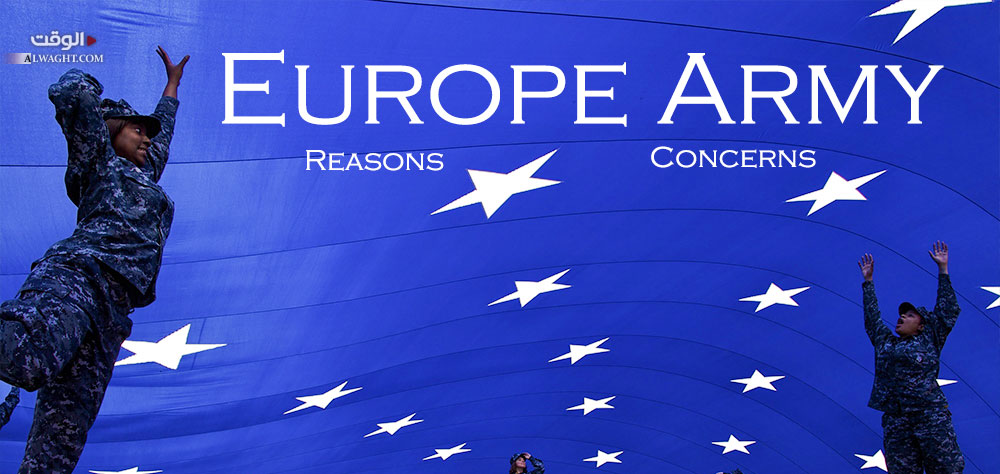Alwaght-Following Britain’s June shock exit from the European Union, there have been calls to formulate a new defense strategy which includes establishing a Euro Army.
During a summit in the Slovak capital on Friday, heads of 27 EU countries named common defense as one of the goals needed to bring the bloc forward as it looks to shake off a sense of inertia.
"There is no continent, there is no union, if there is no defense of what we are when it comes to values and interests," French President Francois Hollande declared. German Chancellor Angela Merkel named a common defense framework as one of the top future EU concerns.
EU Commission President Jean-Claude Juncker has also reiterated that Europe needs an army adding that the US-led North Atlantic Treaty Organization (NATO) military alliance is not enough. He pointed out that NATO was not enough because not all members of the transatlantic defense alliance were in the EU. Juncker believed a common EU army would send important signals to the world.
US Shifts Focus to China, EU faces new security challenges
Europe feels it faces several threats which require a strong military. Some of the major reasons mentioned include Eastern European countries worry about perceived threat from Russia, new fears over increased terrorist attacks and other future challenges.
NATO has for instance not been able to protect European cities, especially Paris, from terrorist attacks. Europe feels it needs to formulate a military strategy based on emerging threats.
Most EU member states also are in US-led NATO. However, there have been calls by US officials and politicians for European countries to increase their defense spending. While the US wants NATO to remain intact, Washington also wants members to show practical commitment to the alliance.
US President Barack Obama this year called out the EU for being "complacent about its own defense," adding "We need a strong Europe to bear its share of the burden." Republican presidential candidate has been more brunt in his criticism of defense ties with Europe. Donald Trump has hinted that if elected, he would make US military support for NATO member states conditional on whether those states have met their financial obligations to the bloc.
Over the recent years, the US has shifted its military machinery to the East Asia region with NATO facing reduced attention from Washington. The US is igniting tensions in the strategic region by fueling tension between China and its neighbors. In the South China Sea, the United States paints China as a threat and uses this pretext to weaponized the area.
Euro Army removes pretext of US military presence
However, while the US demands that European countries have a more active contribution in defending the continent, Washington is averse to seeing a weakened NATO being replaced by a strong European army. Furthermore, a Euro Army could remove the pretext for US forces presence in Europe. The whole concept of NATO dictates that Europe’s defenses should be incomplete, because part of the point is to keep the US involved in Europe.
If Europe is able to take charge of its own security, the continent will also be able to make independent political decision and even confidently contradict US interests including on Russian issue. Having its own army, the EU would also be able to assert its authority and even deploy troops to other parts of the world as it did recently in the Central African Republic.
Not only the US but also Britain which is still negotiating to exit the EU is also opposed to the creation of a Euro Army. UK Defense Secretary Michael Fallon says for as long as the UK is a member of the EU, it will block plans for an EU army. Michael told The Times newspaper. "That is not going to happen. We are full members of the EU and we will go on resisting any attempt to set up a rival to NATO." Tempers are set to rise in Brussels if Britain vetoes a major EU policy while it concurrently negotiates its exit from the union.
Weakened NATO
Following Britain’s exit from the EU, US military experts have warned about a weakened NATO facing Russia. The recent attempted military coup in key NATO member, Turkey, has also diminished the status of the military alliance. General Sir Richard Shirreff, who served as the bloc's Deputy Supreme Allied Commander Europe from 2011 to 2014, expressed concern in the days following July 16. "Sadly, not only will Turkey be weakened by the failed coup, which saw soldiers firing on other soldiers, but NATO as a whole will be weakened". NATO has also been weakened by member countries reducing their defense budgets. Few European NATO countries spend the “required” two percent of GDP on defense, and US has failed to pressure the countries to increase military spending.
Calls for a Euro Army have already been opposed by Eastern European countries, led by Lithuania, Latvia and Estonia and to an extent Poland also in silent opposition. These countries feel they would be exposed to Russia since Western European countries, such as Germany or France, might neglect their duties towards NATO.
It would be interesting to see if European countries can united and put together a joint army parallel to NATO and how these two forces would be integrated. Europe seems determined to set its own path politically, economically and militarily independent of the US. It remains to be seen what would be the reaction of this long awaited move.



























